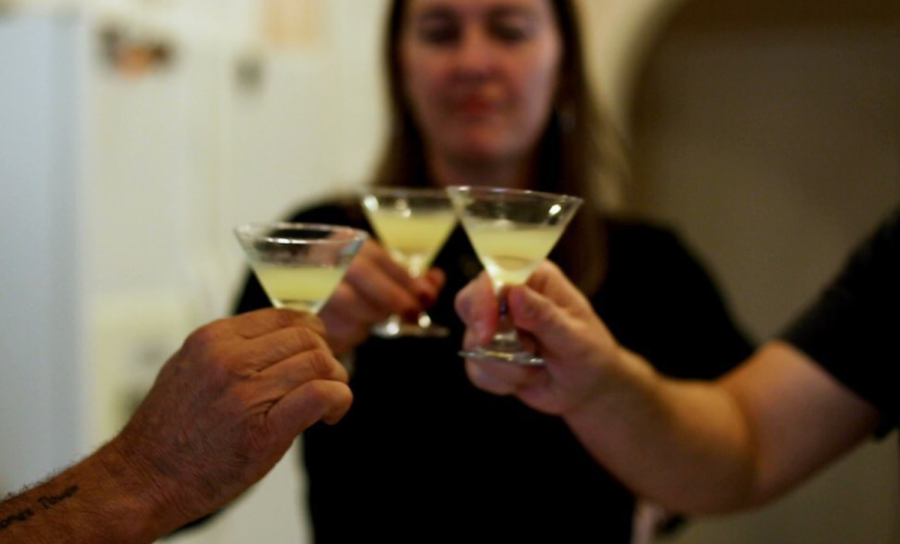A liqueur of legacy: Sara Pistolesi shares family’s ‘Lemoncello’ with Iowa
March 9, 2021
An heirloom can be defined as an object of significance handed down from one generation to another. For some families, this might be an antique engagement ring that gleams on grandma’s finger, or maybe it’s a grand piano, just waiting to be tuned. It could also be a set of fine china, collecting dust in the kitchen cabinet because it’s too pretty to touch. For Iowa State chemistry associate teaching professor Sara Pistolesi, it’s a limoncello recipe.
Pistolesi, born and raised in Piombino, Italy, a small coastal town near Tuscany, spent her days at the beach — it was only a five-minute walk from her home.
“It was a very outdoor life,” Pistolesi said. “It wasn’t just me, it was the culture of all the people of my town. The sea is a part of your life.”
Growing up as an only child, Pistolesi admired her parents and the interests they instilled in her. She originally wanted to go to school to be an archeologist to follow in the footsteps of her family. However, it didn’t take long for her to discover her passion for other sciences.
“In high school, I discovered sciences, and I found I was really proficient in chemistry and biology,” Pistolesi said. “A year before going to college, I started exploring different possibilities because I wanted to know what was out there besides what I already knew. I found chemistry really fascinating, especially basic research.”
Pistolesi attended the University of Siena to study chemistry, defining her studies as “love at first sight.” She graduated there with a master’s in chemistry and a doctorate in chemical sciences. The last year of studying for her doctorate degree, Pistolesi spent some time at the Medical College of Wisconsin, located in Milwaukee.
Shortly after graduation, Pistolesi and her husband embarked on their next adventure — a postdoctoral position at the National Institute of Health, located in Washington, D.C. When they finished their time there, her husband decided to go for professorship, which landed them in Ames, Iowa, in the Iowa State chemistry department. Pistolesi also later joined the department as an instructor of general chemistry laboratories. It was in Ames when her family recipe was discovered.
Originating in southern Italy, limoncello is served as a traditional Italian liqueur. Bottles can be found on dining room tables across the region, often served as an apéritif (before the meal, to stimulate appetite) or a digestif (after the meal, to aid digestion). For Pistolesi, this tradition is a family staple. Originally her grandmother’s, this recipe has been passed down from generation to generation.
“Literally every family in Italy made their own limoncello at home, and my family was no different,” Pistolesi said. “My recipe you can only find in my house — and now in the bottle.”
Pistolesi started perfecting her craft when she was around 19 years old and attending college. The legal drinking age in Italy is 18. Once moving to Ames, her skill was discovered by the former owner of Ames local Italian restaurant, +39.
“[Alessandro Andreoni] was at dinner at my house, and I put the bottle on the table,” Pistolesi said. “He and his wife loved it. They asked me to borrow my recipe so they could make it at the restaurant and give it for free to the customers, and we discovered the customers loved it.”
And so it began. Now known as IA-Native Spirits, Pistolesi’s grandmother’s recipe, referred to now as Lemoncello 50010, can be found in distributors across the state of Iowa, expanding everyday. Pistolesi, along with her two partners Andreoni and David Sarrell, run the business and work to promote it across Iowa.
Lemoncello 50010 stands out among most other limoncello brands due to its smoothness and naturally derived richness in flavor, color and smell.
“The peel of the lemon is really rich in essential oil,” Pistolesi said. “That not only gives the color but also the lemon taste. If you have a lot of essential oils in your product, those mask the harshness of the alcohol.”
Pistolesi’s background in chemistry and passion for the Italian lemon liqueur work together seamlessly, especially when it comes to mass production.
“There is a big difference between producing something at home on a small scale and producing it for mass production on a large scale,” Pistolesi said. “The chemistry involved is the same in principle, but in reality, there are so many other things you need to take into account. Knowing the chemistry principles behind the production of the liqueur helped me a lot when we had to scale up at the distillery so that I was able to prevent some possible issues that we could have.”
Next time you’re hosting a dinner party or need a good pairing with pasta, get your hands on a bottle of Lemoncello 50010. It might give you a glimpse of what family dinner is like on a typical evening in southern Italy.
“It’s more than business because it’s part of my family tradition,” Pistolesi said.
For more information and to find retail locations, check out the IA-Native Spirits website.
*For 21 and older.







